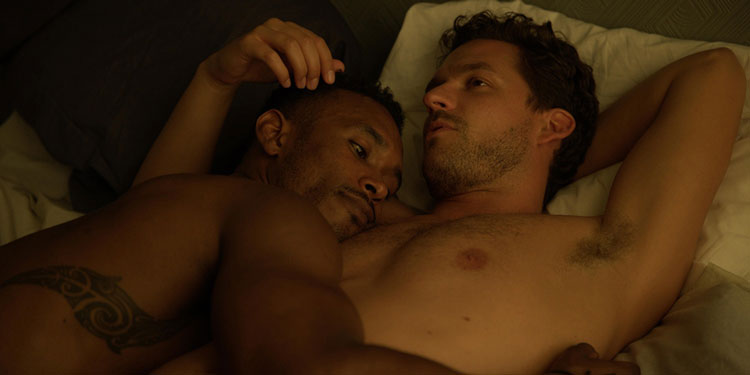While this year’s Iris Prize Festival went online, that certainly didn’t affect the quality of the shorts competing for the £30,000 LGBT+ International Short Film prize. Here’s our thoughts on the shorts from the first three programmes.
All the films that screened as part of the Iris Prize Festival are available to view on a pay-as-you-go basis to viewers in the UK until the end of October 2020 – Find out more here.
Read our reviews of the other 2020 Iris Prize Shorts: Part 2 and Part 3
Victoria
Director: Daniel Toledo Saura, Spain, 8 mins
A woman enters a plant shop to talk to the owner. Ana has never met Clara before, but they have a long shared history, as well as a child from before Clara started outwardly living as a woman. They’ve spoken little since Clara transitions, but while Ana wants to keep things civil, soon both can’t help but bring up tensions that have been simmering for months. Victoria is the sort of film that’s both simple and complex at the same time – it’s one location and two people, but the script manages to pack in a lot. You could imagine it being a section from a lot longer film – in fact that may be its biggest flaw, in that it feels like so much like a vignette from a much longer story that it’s difficult to know what to take away from it at the end.
3 out of 5
The Way We Are
Director: Amanda Ann-Min Wong, Canada, 16 mins
Fascinating and beautiful, The Way We Are features audio interviews with four Asian woman living in Toronto, Canada, reminiscing about growing up queer and their journey through the world. Their words are juxtaposed with home video and pictures, illustrating the women’s story. The effect is almost like a collage, with the stories, audio and images intermixing, smartly bringing together the similarities and differences between the women’s stories. While not shying away from the difficulties, it is ultimately an inspiring documentary look at being queer and Asian, as well as the founding of a group called Asian Lesbians of Toronto and its importance in the women’s lives.
4 out of 5
Selma After the Rain
Director: Loli Menezes, Brazil, 12 mins
This black and white short follows trans woman Selma, who after decades in the city returns to her more rural home to look after her mother, who now has Alzheimer’s. It is a bittersweet return, with Selma finding her old bedroom left almost like a shrine to when she was a teenage boy, as well as dealing with a mother whose own identity is disintegrating. It’s a wonderful idea with some brilliant moments, but a tendency towards the hyperbolic undercuts what Selma After The Rain might otherwise have been, to the point where it’s difficult not to wonder whether it hasn’t actually been about very much at all.
2 out of 5
THRIVE
Director: Jamie Di Spirito, UK, 18 mins
There are echoes of Andrew Haigh’s Weekend in THRIVE, which follows two men who hook up through a dating app. However, while they’ve come together for sex, it’s clear they’re actually looking for different things. That leads to an unexpected conversation where both reveal things they weren’t expecting. Many gay men will relate to the film’s look at so-called ‘hookup culture’, where what seems on the surface to be all about sex often hides competing desires and complexities, and that what people may think they want from a one-time fling may not be what they actually need. It’s a sweet film that brings up some interesting points about our inner lives and also how we probably ought to talk about HIV in the current age. Although there are moments where it veers towards contrivance, it’s still a strong watch.
4 out of 5
We Need to Talk About the Ring
Director: Yichi Chen, Taiwan, 30 mins
Xin has been living in the US, but decides to return home to Taiwan at the same time as same sex marriage becomes legal in the country. After proposing to her girlfriend, Xin then needs to start introducing the idea of who she is and who she wants to marry to her family. However, that isn’t going to be easy with a father who’s already suspicious and quick to anger, and a mother who’d prefer to stay in denial. We Need to Talk About the Ring is a measured and well made film, filled with beautifully framed shots that do as much to uncover the characters as the script and acting to. If there’ds one flaw it’s that the story feels overly familiar, and while we may not have seen this story many times from Taiwan, it certainly spends most of its time in the same heartfelt territory that many other filmmakers from many other countries have trodden.
3 out of 5
Boys (Banim)
Director: Lior Soroka, Israel, 14 mins
Israeli teen Nadav is only 17.years old but wants to serve in a combat unit, something his mother isn’t keen on – she’d prefer him to do his service in the intelligence corps – and he needs her permission to get what he wants. Then, a conversation with his coach leads to an unexpected encounter. Sweet and well acted, Boys keeps you watching as it feels like it’s taking you somewhere, only to end in a way that makes the whole thing seem a little inconsequential. It’s a window into a couple of key moments in a young man’s coming of age, but not in a way that seems truly connected to anything. It’s the sort of film that will speak to some people, while leaving others cold – it strikes me as more a filmmaker’s film than an audience’s.
2 out of 5
Saving Chintu
Director: Tushar Tyagi, India, 25 mins
After living in the US, Sam returns to India with his boyfriend, Oli, so that they can adopt an HIV+ child. All seems to be going well until they reach the orphanage and suddenly, rather than just admitting they’re a gay couple, Sam announces to the director of the orphanage that he’s married to his female friend who’s gone with them. This sudden left-turn causes cracks to widen in Oli and Sam’s relationship. Saving Chintu is one of those short films that feels like it could be showcase for a feature film. Sometimes that sensation can undermine the short itself, but not in this case as it manages to take an expansive and complex story and tell it with heart and love. While it would have been nice if there’d been more time to expand on certain ideas, it does a good job of giving a glimpse into the cultural and personal issues at stake in a way that feels inclusive.
4 out of 5
Orville + Bob
Director: Alan Griswold, USA, 40 mins
This documentary takes a look at the lives of the title characters, two older American gents – one black and one Jewish – who’ve been together as a couple for almost 50 years. Through interviews with each of them, they recount their lives and the changes they’ve seen, the struggles they had growing up in a homophobic and racially segregated world, and how they found one another. They’re both great characters and they certainly have an oral history that’s worth recording and watching, particularly as between them they represent a cultural nexus of race, religion, class and sexuality, from before Stonewall, through the AIDS era and beyond, underpinned by a story of love and acceptance. They have a great story to tell that will leave a smile on your face.
4 out of 5
The Shawl
Director: Sara Kiener, USA, 7 mins
A pair of boyfriends recount the story of how after, having spent ages apart from one another, they reunite for a Stevie Nicks concert. The documentary audio of the couple talking about the concert is backed up by stylised animated visuals. It’s short and sweet and may not add up to a vast amount, but it’s a bright and fun insight into a particular type of queer experience that can sometimes be either sidelined or ridiculed due to the fact it’s camp and somewhat over the top. What the film manages to show is that it’s not just frivolous – there’s more going on in these big men’s lives than a dusting of glitter.
3 out of 5
Read our reviews of the other 2020 Iris Prize Shorts: Part 2 and Part 3


Leave a Reply (if comment does not appear immediately, it may have been held for moderation)